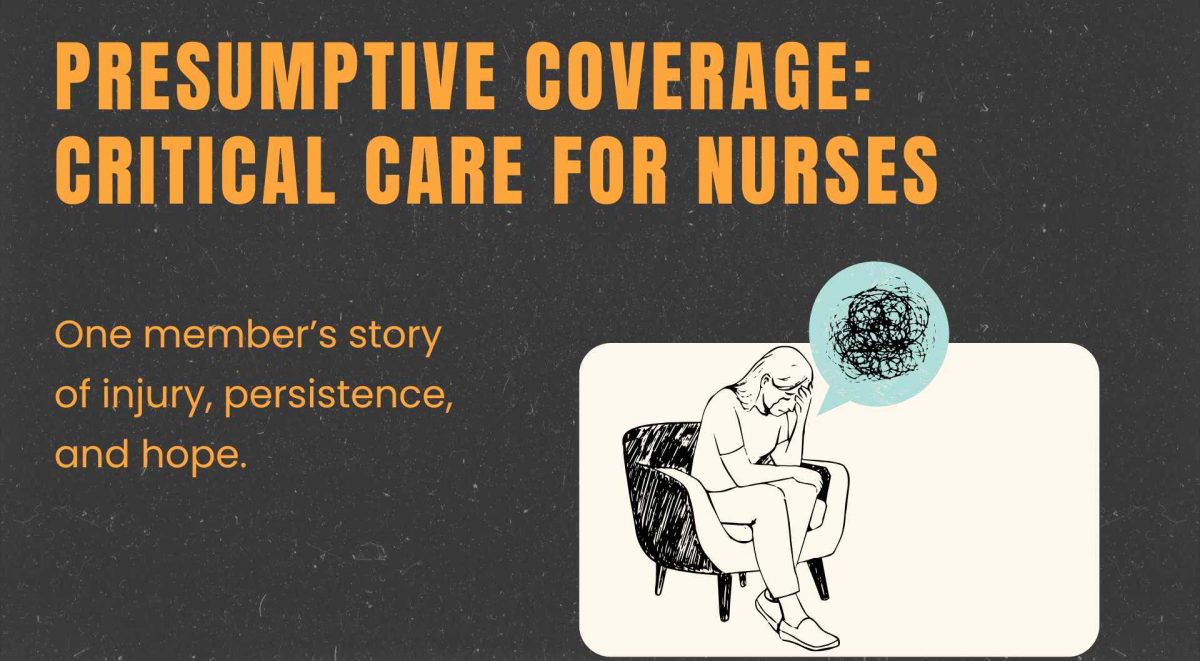
Presumptive Coverage: Critical Care for Nurses
One member’s story of injury, persistence, and hope.
You may have heard nurses’ call for presumptive coverage for traumatic psychological injury for nurses in Alberta. Do you know what it is or why it is important that nurses have coverage from WCB?
Presumptive coverage for traumatic psychological injury is provided by WCB for first responders, emergency dispatchers, and correctional officers—but not for nurses. When a first responder is exposed to a traumatic event at work, and subsequently receive a psychological diagnosis, they are automatically covered by WCB to receive traumatic psychological care. When a nurse is exposed to the same traumatic event and subsequently receives a psychological diagnosis, they are not immediately covered by WCB and must prove that the psychological diagnosis is a result of the traumatic event.
Because nurses must prove that their injury is a result of a traumatic work event, they do not immediately receive trauma-informed care, often leading to a worsening of symptoms, delayed recovery, and feelings of lost hope.
The only obvious difference between first responders and nurses is that first responders are most often male, and nurses are most often female. Is this a gender issue from lingering discriminatory social structures? Regardless, nurses need and deserve presumptive coverage for traumatic psychological injuries.
In this story, one courageous AAN member shares their experience advocating for presumptive psychological coverage for nurses, motivated by their personal experience. (Some details have been changed to protect the member’s identity.)
_______________________________________
“I began my journey in 2019. There was no legislation to provide presumptive coverage for nurses. I acquired a psychological traumatic stress injury at work, and I was not prepared for the lack of accessible, trauma-informed care that I needed. As a nurse, I knew that early intervention results in better outcomes. Due to all the systems involved and lack of trauma-informed knowledge within systems, I did not get the care I needed. I had no idea how challenging it would be, and still is, to get coverage for healing from a horrific injury like this.
We have care plans for our patients. But there was no care plan for me. Early interventions would have made a big difference. Having a peer walk alongside me (like EMS, police, and firefighters have access to) would have provided much needed support; instead, I was alone and very isolated. I was motivated to heal but supports were lacking or denied without explanation from insurance providers and WCB.
Most people that were involved in my care had little knowledge and no training about trauma sensitivity care. At one point, I was told I needed to go back to work (without receiving the care that I needed or was denied), and I was reinjured. Despite my motivation to heal, my recovery was stalled due to interactions with insurance providers and WCB who provided no care because I was not covered because I was a nurse. I had to find and pay for therapy and treatments myself.
In 2020, I discovered that nurses in Alberta had presumptive coverage at one time, but the UCP government changed the legislation, denying nurses presumptive coverage.
Nurses are also first responders/first receivers. We should get necessary treatment without continual bureaucratic shuffling by employers, unions, insurance providers, and WCB. Firefighters, police, EMS all have this legislation in place and get immediate services and peer support to address the needs when injured with PTSD/occupational stress injuries. All provinces have this coverage for nurses except for the Yukon, New Brunswick, and Alberta. Most nurses do not know this.
After a year of suffering in silence with no medical support provided by supplementary health insurance or WCB, I met nurses with similar experiences through Nurse 2 Nurse Peer Support, a grassroots federal non-profit created by nurses for nurses. I finally found some trauma-sensitive support. Words cannot express how I felt knowing I was not alone and there was support, hope, and healing for this injury.
As I began to recover, I started to question why presumptive coverage was not available for nurses. I wrote letters and invited myself to Zoom calls with politicians. I met roadblocks, but I persisted and found myself speaking and meeting with many political people, from all political parties, advocating to restore presumptive coverage for nurses. There were many hurdles, but I did not give up.
I found two resources about presumptive coverage (http://www.abnursesforchange.com/) and an video that describes the impact on nurses who lack coverage (https://vimeo.com/1021101261).
Progress has been made towards restoring presumptive coverage for nurses, but the work is not done. Nurses need to speak up and continue to hold politicians accountable to restore presumptive coverage for traumatic psychological injury for nurses.
_______________________________________
In recent months, there has been progress towards restoring presumptive coverage for nurses. During recent contract negotiations, the United Nurses of Alberta was able to secure a commitment from Minister of Jobs, Economy and Trade, Matt Jones, committing to taking a proposal to cabinet to extend presumptive coverage by SCB to RNs and RPNs by June 30, 2025. The Alberta Association of Nurses (AAN) sent Minister Jones a letter supporting the proposal and requesting that presumptive coverage be extended to ALL nurses, including LPNs and NPs. AAN has requested to meet with Minister Jones to discuss the proposal, and we are waiting on his response.
Presumptive coverage for traumatic psychological injury for ALL nurses is desperately needed in Alberta. AAN members are encouraged to contact their MLA to discuss and request support for this critical legislation change.
